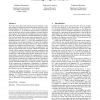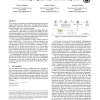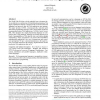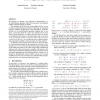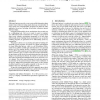75
Voted
POPL
2015
ACM
9 years 10 months ago
2015
ACM
We show that the weak memory model introduced by the 2011 C and C++ standards does not permit many common source-tosource program transformations (such as expression linearisation...
80
Voted
POPL
2015
ACM
9 years 10 months ago
2015
ACM
74
Voted
POPL
2015
ACM
9 years 10 months ago
2015
ACM
We want to prove that a static analysis of a given program is complete, namely, no imprecision arises when asking some query on the program behavior in the concrete (i.e., for its...
75
Voted
POPL
2015
ACM
9 years 10 months ago
2015
ACM
We present a new approach for predicting program properties from massive codebases (aka “Big Code”). Our approach first learns a probabilistic model from existing data and th...
70
Voted
POPL
2015
ACM
9 years 10 months ago
2015
ACM
We propose a new approach to programming multi-core, relaxed-memory architectures in imperative, portable programming languages. Our memory model is based on explicit, programmer-...
73
Voted
POPL
2015
ACM
9 years 10 months ago
2015
ACM
The World Wide Web has evolved gradually from a document delivery platform to an architecture for distributed programming. This largely unplanned evolution is apparent in the set ...
75
Voted
POPL
2015
ACM
9 years 10 months ago
2015
ACM
Concurrent data-structures, such as stacks, queues, and deques, often implicitly enforce a total order over elements in their underlying memory layout. However, much of this order...
65
Voted
POPL
2015
ACM
9 years 10 months ago
2015
ACM
Software-defined networking (SDN) is a new paradigm for operating and managing computer networks. SDN enables logicallycentralized control over network devices through a “contr...
73
Voted
POPL
2015
ACM
9 years 10 months ago
2015
ACM
In this paper, we present a new approach to automatically verify multi-threaded programs which are executed by an unbounded number of threads running in parallel. The starting poi...
83
Voted
POPL
2015
ACM
9 years 10 months ago
2015
ACM
Differential privacy provides a way to get useful information about sensitive data without revealing much about any one individual. It enjoys many nice compositionality properties...


